
Money laundering is considered one of the most severe financial crimes, committed by organized crime groups worldwide. Simply put, money laundering is the act of covering up the origins of illegally sourced income. This lets criminals avoid prosecution for the original crime of obtaining said “dirty money” in the first place.
Republic Act No. 9160, or the Anti-Money Laundering Act of 2001, seeks to prevent and punish cases of money laundering in the Philippines. Here’s what you need to know.
What is money laundering and how does it work?
Money laundering “cleanses” any illegally obtained money by passing it through legitimate transactions. Doing so essentially overwrites the money’s initial origins. This then allows criminals to get away with their illegal income methods and avoid taxation.
The following actions are considered to be acts of money laundering:
- Transacting any money or property with the full knowledge that it relates to some type of unlawful activity.
- Attempting yet failing to transact any money or property with the full knowledge of its unlawful origins.
- Refusing to disclose any cases of illegally obtained money to the Anti-Money Laundering Council (AMLC).
What is the Anti-Money Laundering Council and what do they do?
To address the issue of money laundering, the Anti-Money Laundering Council (AMLC) was formed alongside the Anti-Money Laundering Act of 2001. Core members include the Governor of the Bangko Sentral ng Pilipinas as the chairman, both the Commissioner of the Insurance Commission and the Chairman of the Securities and Exchange Commission as members, and a secretariat. The functions of the AMLC are as follows:
- Investigates suspicious transaction reports (STRs) and currency transaction reports (CTRs) from covered institutions;
- Has the authority to freeze accounts that are suspected of being related to unlawful activity;
- Has the authority to inquire into or examine any particular bank deposit or investment that is suspected of being related to unlawful activity;
- Collaborates with local and international law enforcement agencies and financial intelligence units in the investigation and prosecution of money laundering cases; and
- Develops educational programs about money laundering, including its harmful effects, methods and techniques, ways to prevent, and ways to prosecute and punish offenders
What penalties will guilty parties face?
The penalties listed in this act vary depending on the crime committed. They are as follows:
- Money Laundering. The punishment depends on the specifics of the crime:
- Any person who transacts any money or property with the full knowledge that it relates to some type of unlawful activity will be punished with imprisonment ranging from 7 to 14 years and a fine of at least Php3,000,000 but not more than twice the value of the money or property involved in the crime.
- Anyone who attempts yet fails to transact any money or property with the full knowledge of its unlawful origins will be punished with imprisonment ranging from 4 to 7 years or a fine of at least Php1,500,000 but not more than Php3,000,000, or both.
- Any person who refuses to disclose any cases of illegally obtained money to the AMLC will be punished with imprisonment ranging from 6 months to 1 year or a fine of at least Php100,000 but not more than Php500,000, or both.
- Failure to Keep Records. Any person who fails to keep proper records for his/her covered institution will be punished with imprisonment ranging from 6 months to 1 year or a fine of at least Php100,000 but not more than Php500,000, or both.
- Malicious Reporting. Any person who falsely accuses another of a money laundering transaction out of malice or bad faith will be punished with imprisonment ranging from 6 months to 4 years and a fine of at least Php100,000 but not more than Php500,000, at the discretion of the court: Provided, that the offender is not entitled to avail the benefits of the Probation Law.
- If the offender is a corporation or similar entity, the responsible officers may face the penalties. The court can also suspend or revoke the entity’s license.
- If the offender is an alien, he/she will be deported after the penalties have been served.
- Public officials or employees who refuse to testify may also face these penalties.
- Breach of Confidentiality. Any person who breaches confidentiality by leaking the records of covered institutions will be punished with imprisonment ranging from 3 to 8 years and a fine of at least Php500,000 but not more than Php1,000,000.
How can money laundering be prevented?
A huge part of preventing money laundering is ensuring that covered institutions meticulously record their transactions and customers.
“Covered institutions” refer to entities such as banks, non-banks, quasi-banks, trust entities, insurance companies, securities dealers, brokers, investment houses, mutual funds, pre-need companies, foreign exchange corporations, and other similar financial entities regulated by the BSP, Insurance Commission, or SEC.
Covered institutions can help prevent money laundering by doing the following:
- Keep a record of the true identity of their clients based on official documents;
- Maintain and store all records of all transactions from the past 5 years; and
- Report all covered transactions to the AMLC within 5 working days of their occurrence, unless the Supervising Authority concerned prescribes a longer period not exceeding 10 working days.
Can money laundering affect me personally?
Yes. This is because some money laundering strategies get innocent parties into helping criminal organizations, either knowingly or unknowingly. These parties are “money mules.”
Criminal organizations use money mules by transferring the dirty money to their accounts. The money mules then use a series of transfers and transactions to cover up the money’s origins, and then return the funds to the criminal. Money mules either use their accounts or their business accounts for this technique and are sometimes roped into it by falling for a scam organized by the criminal.
By staying aware, you can prevent criminals from turning you or your business into an unwitting money mule. Money laundering criminals are good at coming up with incentivizing scams that many people fall for. It’s up to you and your discernment to differentiate scams from genuine opportunities. Here are a few examples of scams to watch out for:
- Job scams. A criminal organization can contact you about a ‘work opportunity’, with enticing pay and no experience required. Your workload would then consist of accepting and sending money transfers through your account. This covers up the tracks of dirty money and successfully integrates you into a complex money laundering scheme.
- Romance scams. A criminal might form a fake relationship with the victim, making the victim vulnerable to emotional manipulation. The criminal would then either ask the victim for help with money transfers or request access to the victim’s accounts, which the criminal can then use for money laundering.
- Impersonation scams. Criminals can impersonate themselves as employees of a government agency or bank and then ask you for your personal bank details.

